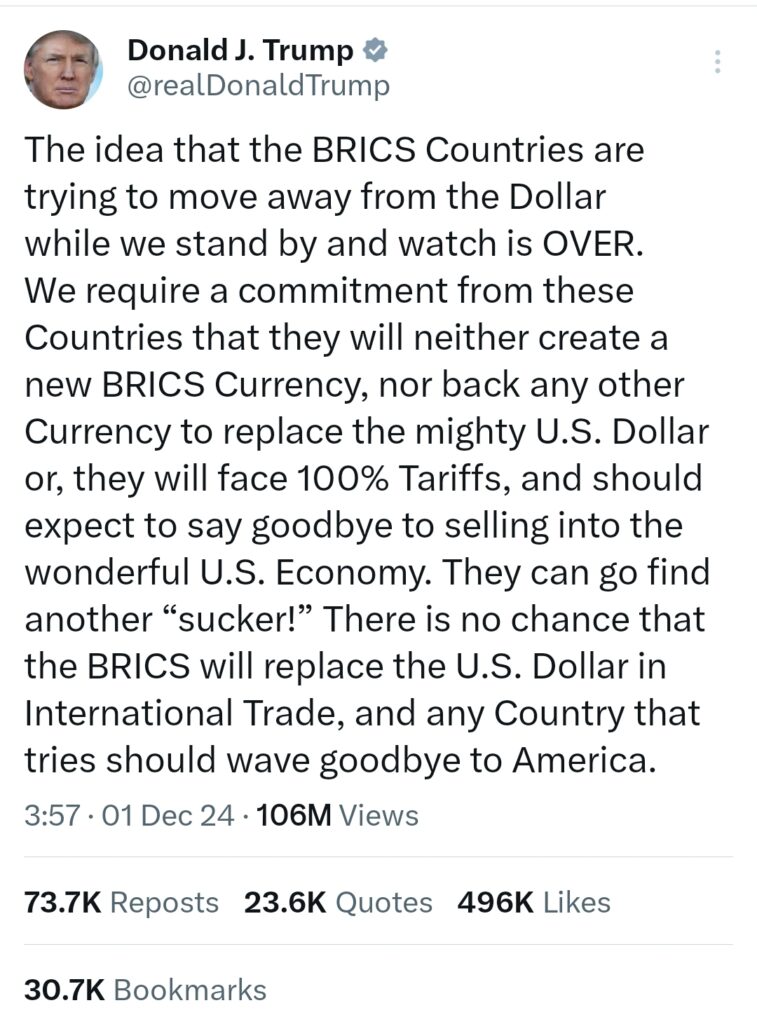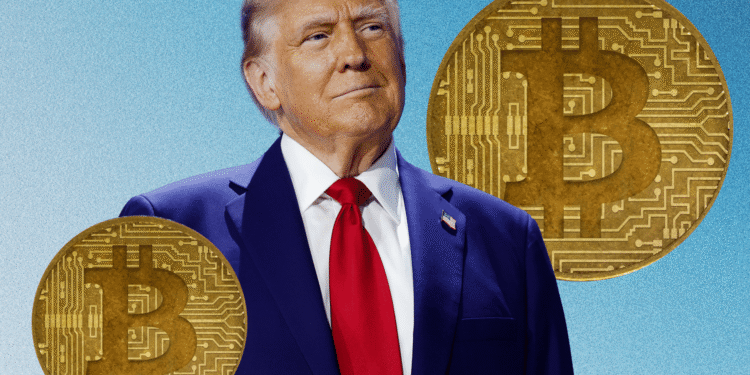Bitcoin has shattered records by reaching the highly anticipated $100,000 mark, cementing its role as a major disruptor in the global financial landscape. While President-elect Donald Trump recently launched a fiery attack on BRICS nations for their push towards de-dollarization, the real challenge to U.S. dominance might not be BRICS, but Bitcoin.

Trump’s campaign trail included signals of potential favorability towards cryptocurrencies, a move that may have bolstered Bitcoin’s momentum. However, as the world embraces decentralized finance, the question arises: Will the Trump administration recognize the cryptocurrency boom as an opportunity or a threat?
The BRICS Threat: A Misdirected Focus?
Trump’s recent statement condemning the BRICS coalition (Brazil, Russia, India, China, and South Africa) for exploring a potential unified currency highlighted his administration’s concerns over threats to the U.S. dollar’s hegemony. While BRICS’ ambitions to challenge the dollar in global trade are significant, their progress remains limited due to internal conflicts and logistical hurdles.
In contrast, Bitcoin represents a far more immediate and potent challenge. Decentralized, borderless, and gaining rapid mainstream acceptance, Bitcoin undermines the control of central banks and could diminish the dollar’s dominance as the global reserve currency.
Bitcoin’s Unstoppable Rise
Bitcoin’s leap to $100,000 reflects a combination of:
1. Global Economic Uncertainty: Rising inflation and monetary instability have driven individuals and institutions to seek alternatives.
2. Wider Adoption: Nations like El Salvador have embraced Bitcoin as legal tender, while major corporations continue integrating it into payment systems.
3. Growing Retail and Institutional Investment: From everyday investors to Wall Street giants, Bitcoin is increasingly seen as “digital gold.”
These factors highlight a critical shift in global financial systems—one that the U.S. cannot ignore.
Trump’s Crypto Dilemma
While Trump’s campaign may have benefited from crypto donations and support from digital finance advocates, his administration could face a conflict between encouraging innovation and protecting U.S. economic interests. Bitcoin’s growth directly challenges the centralized control of monetary policy, a cornerstone of federal governance.
Moreover, the rise of Bitcoin undermines the U.S. dollar’s role as a tool of geopolitical influence. Unlike BRICS’ proposed currency, Bitcoin’s appeal lies in its decentralized nature, making it less susceptible to manipulation by any single nation or coalition.
The Future of U.S. Crypto Policy
If Trump hopes to counter the growing threat of Bitcoin and other cryptocurrencies to the dollar, his administration will need to strike a delicate balance:
1. Regulation Without Stifling Innovation: Over-regulating crypto could push innovation offshore, while under-regulating risks destabilizing the financial system.
2. Positioning the U.S. as a Crypto Leader: Encouraging blockchain and cryptocurrency innovation within U.S. borders could help the nation maintain its global financial dominance.
3. Leveraging Bitcoin’s Popularity: Recognizing Bitcoin’s potential as a legitimate asset class could integrate it into traditional finance while mitigating risks.
Bitcoin vs. BRICS: The Real Disruptor
While BRICS presents a symbolic challenge to the U.S.-led financial order, Bitcoin’s decentralized nature represents a more profound shift. As Bitcoin crosses $100,000, its adoption accelerates globally, potentially creating a parallel financial system that undermines centralized powers like the U.S. Federal Reserve.
Unlike BRICS, Bitcoin cannot be influenced by diplomacy or sanctions. Its strength lies in its independence, transparency, and resistance to external control—a reality that could redefine global finance in ways no coalition or nation-state can.
A New Financial Paradigm?
Trump’s focus on BRICS as a threat to U.S. economic dominance might be overshadowing the larger challenge posed by Bitcoin. As the cryptocurrency breaks new ground, it signals a shift towards a decentralized financial system that governments can neither ignore nor fully control.
For the Trump administration, the coming years will require bold decisions to navigate this dual challenge. The real question is not how to counter BRICS but whether the U.S. can adapt to a world where Bitcoin and other cryptocurrencies reshape the financial playing field.
In the end, Trump may find that the decentralized revolution Bitcoin represents is a far more significant challenge than any coalition of nations could ever pose.















Comments 1